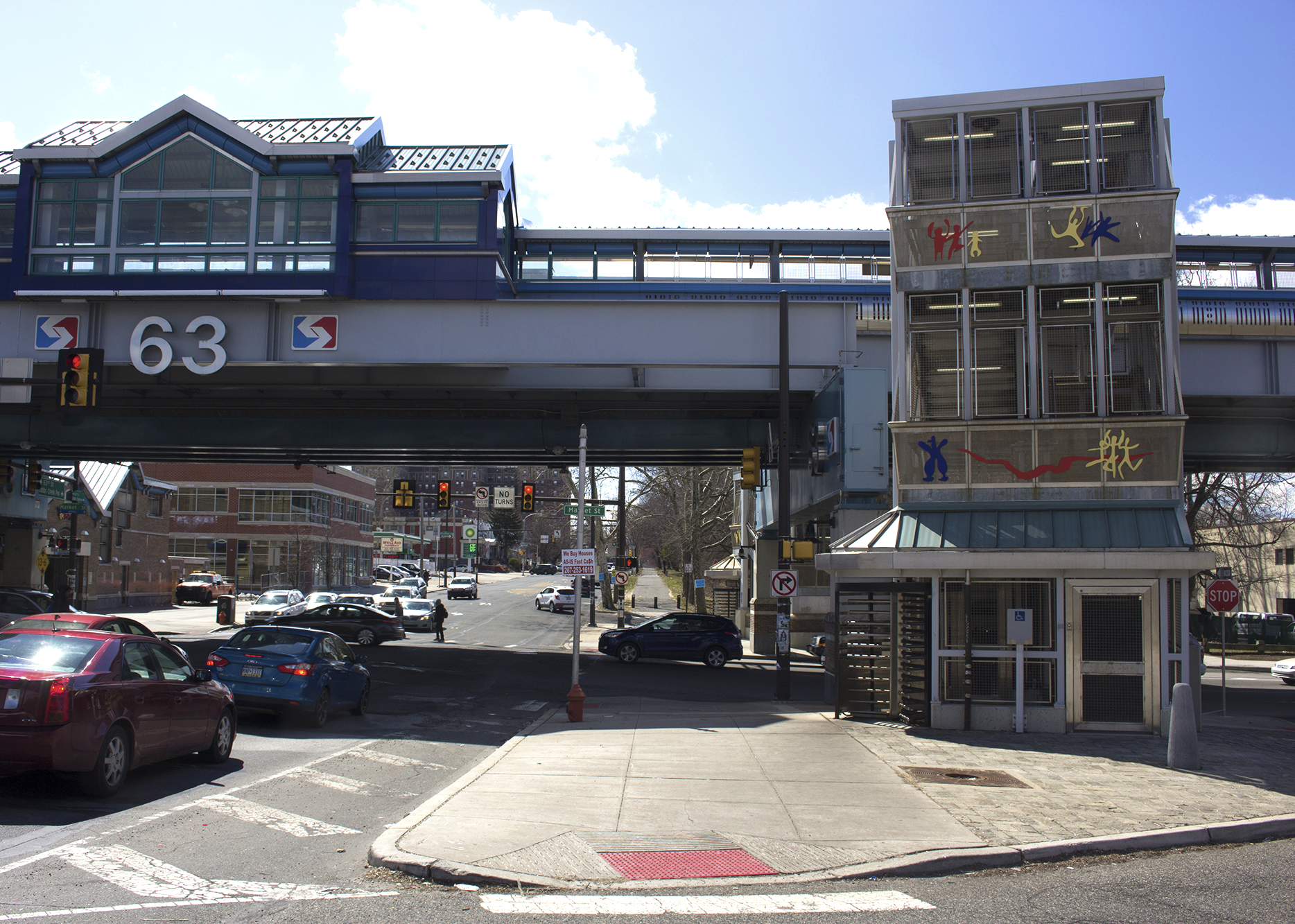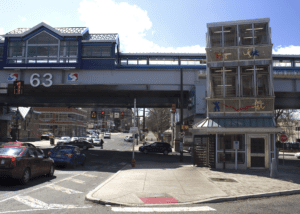
July, 5, 2021 – Communities identified by the Environmental Protection Agency (EPA) as Environmental Justice communities are more likely to experience issues that negatively impact pedestrian safety and result in higher rates of pedestrian fatalities from traffic crashes. According to PennDot, fatal or serious injuries from crashes are three times more likely to occur in low income communities and 30% more likely to occur in communities of color. These communities face real challenges to pedestrian safety including poor sidewalk conditions, lack of access to green space, and under funding for maintenance and safety enhancements.
Sidewalks are the foundation for walkability, and sidewalk condition is a major factor in deciding how people travel. Philadelphia has hundreds of miles of sidewalks in poor condition, with no concrete plan to fix them. The Council and its volunteer pedestrian advocacy group Feet First Philly work to improve the pedestrian environment in every neighborhood, protect the rights of pedestrians, and encourage walking as a mode of transportation, exercise, and recreation through public education, outreach, advocacy, and technical assistance to communities.
In 2020, Feet First Philly launched a sidewalk campaign to fund sidewalks like streets. Currently, homeowners are responsible for costly sidewalk repairs, which forms a barrier and liability for many residents who cannot afford to fix damaged sidewalks. Feet First Philly’s sidewalks campaign asks the city to set aside $500,000 to hire a full time sidewalks coordinator, conduct a sidewalk master plan, and create sidewalk repair funding strategy, as recommended by a 2018 Sidewalk Policy Transportation Community Development Initiative (TCDI) to the Office of Transportation & Infrastructure Systems.
Feet First Philly and the Council advocated for the sidewalk campaign through an op-ed in the Inquirer calling for the city to take action, by meeting with Councilmembers in preparation for budget season, and sending an action alert urging Mayor Kenney and City Council to fund sidewalks in the next budget. This spring, the Council and Feet First Philly joined 24 organizations advocating for Livable Communities budget requests, including dedicated funding for Vision Zero, transit, and sidewalks.
In addition to this budget campaign, the Feet First Philly Pedestrian Advocacy Guide connects people to city agencies and helps them navigate services to address safety concerns. Feet First Philly also developed two walk audit tools to engage residents, neighborhood leaders, students, and stakeholders to identify risks to pedestrians and connect residents to resources that can address these concerns.
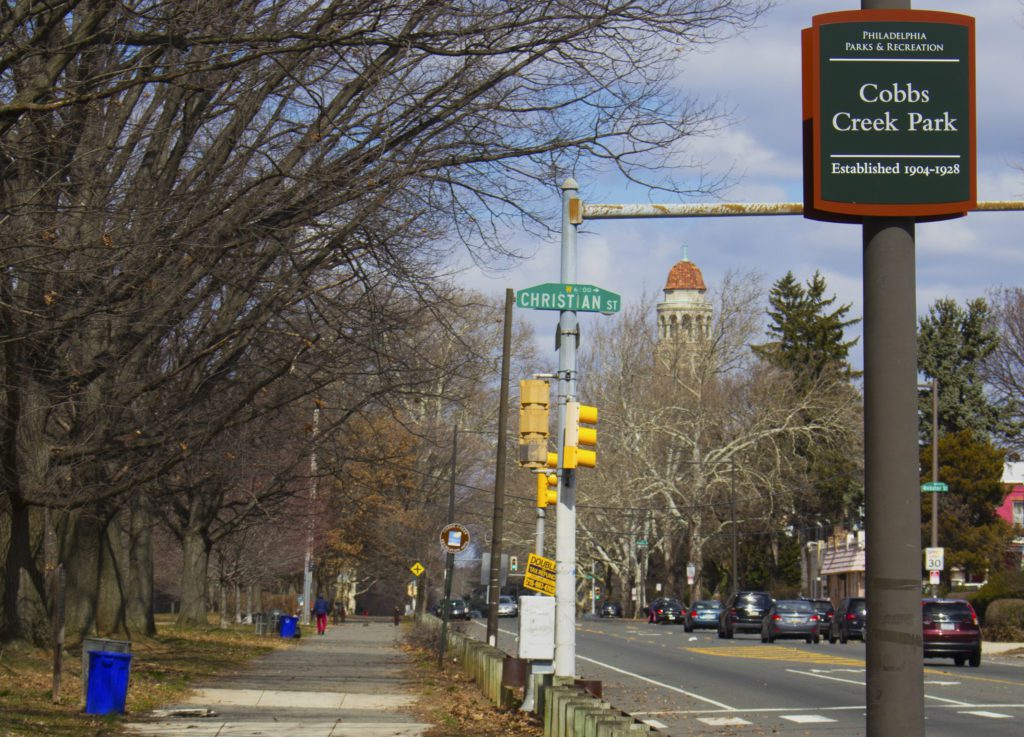
Highway design that prioritizes vehicle speed over pedestrian safety is a legacy issue that disproportionately affects communities of color in Philadelphia. Pedestrians accounted for just 7% of people involved in crashes from 2014 to 2018, but made up 40% of people killed in crashes during this period. Highly trafficked roads like Cobbs Creek Parkway make up the High Injury Network, the 12% of all Philadelphia roads that claim 50% of all traffic deaths and severe injuries.
For the past two years, the Council has connected residents, stakeholders, elected officials, and city agencies to work together to address the largest hurdle to accessing Cobbs Creek Park and Trail, which is the dangerous Cobbs Creek Parkway. The Parkway is a physical and mental hurdle for residents trying to access the park and connected trails and dangerous speeds, reckless driving, and lack of safe crossings are barriers that make the park and trail difficult and dangerous to visit. Tragically, the lives of three people were taken along the Parkway in the past year.
The Council partnered with Cobbs Creek residents to address their concerns and demand change. This resulted in the installation of speed hump and delineator posts. The Council continues to advocate for safety upgrades, and the City recently applied for funding to install new state of the art pedestrian crossings along Cobbs Creek Parkway. These would fill crossing gaps that stretch more than a mile and a half long and increase accessibility to this important trail and greenspace in one of the most dense areas of the city.
For more information contact Will Fraser, Transportation Project Manager, wfraser@cleanair.org
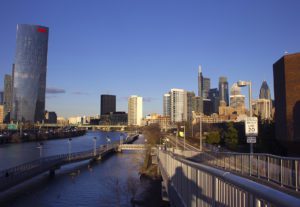
Last year was a difficult one for all of us, and the events that transpired in 2020 challenged every aspect of our society and our lives. Like many of the Council’s programs, the Council’s pedestrian advocacy group Feet First Philly was impacted, but the group adapted to meet the evolving needs of pedestrians. The pandemic reinforced the need for better public space conducive to walking and rolling, and Feet First Philly was a key voice in creating Philadelphia’s Recovery Streets program which pushed for more open streets and ways to better use public space during the health crisis.
Feet First Philly announced the release of its Pedestrian Advocacy Guide last Summer. The guide connects residents and community groups to existing city resources that are often tough to navigate. The guide helps individuals and civic organizations identify risks pedestrians face in their own neighborhoods and find solutions to address those issues with information about sidewalks, road conditions, parking, driver behavior, and quality of life issues that impact pedestrians.
Feet First Philly also partnered with Temple University’s Office of Sustainability in October to launch a Walk Audit Certification Program for students. Over twenty graduate and undergraduate students from five colleges including Fox School of Business and Tyler School of Art and Architecture participated in the certification program. The two-part training taught students how to evaluate the pedestrian experience and conduct a qualitative walk audit.
Park and trail lovers of all ages were invited to participate in a Virtual Scavenger hunt in November and December at four amazing Philadelphia parks. Visitors downloaded Bingo cards before heading to FDR Park, Cobbs Creek Park, Tacony Creek Park, and Grays Ferry Crescent Park and keeping social distance they looked for clues and posted pictures online. Lucky winners earned great prizes including backpacks and sunglasses while they spent quality time outdoors.
Feet First Philly also got a new logo in 2020! Follow Feet First Philly on Facebook, Twitter, and Instagram and let us know what you think of the new look.
The year ended strong with over 30 applications for Feet First Philly’s public space enhancement mini-grant. Submissions varied widely and showcased many interesting projects and ideas from civic groups in Philadelphia. Applications are currently being reviewed, and grantees will be awarded up to $2000 to fund their projects early this year.
Feet First Philly is Philadelphia’s only advocacy group dedicated to pedestrian rights. For more info on this group’s advocacy work including how you can get involved, contact Titania Markland at tmarkland@cleanair.org
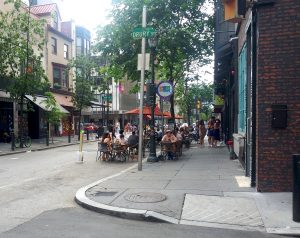
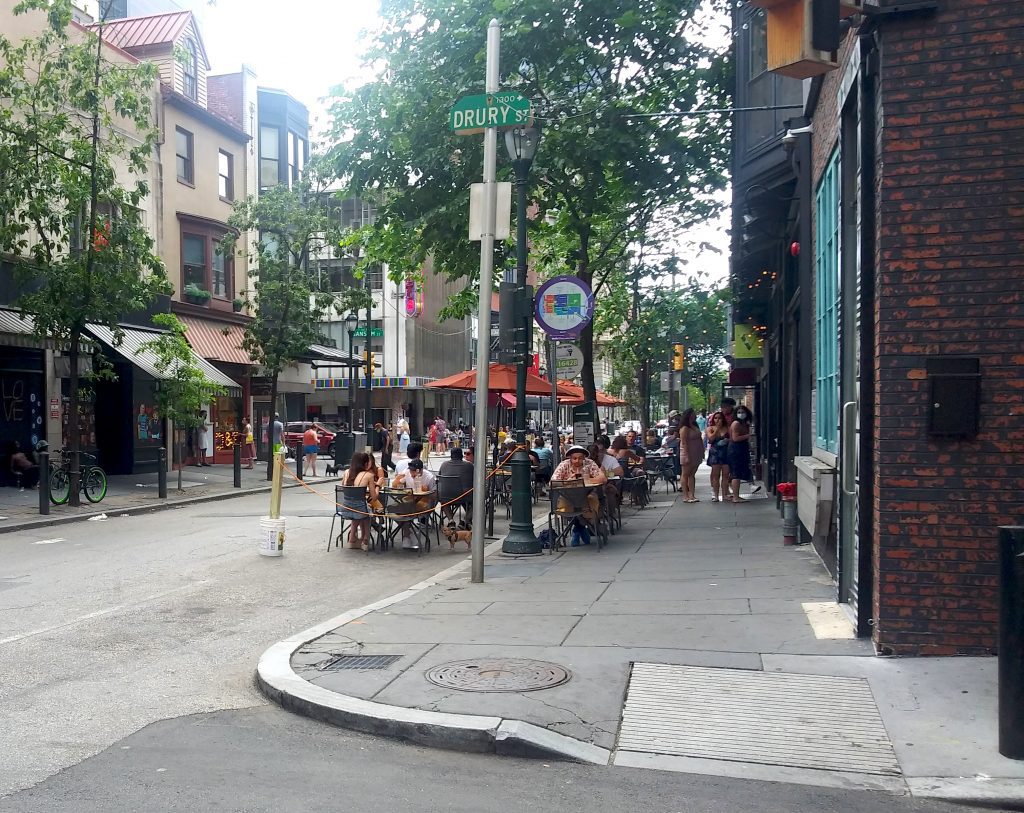
(JUNE 25, 2020 – PHILADELPHIA, PA) — Clean Air Council and Feet First Philly applaud City Council for passing bills 200351 and 200352. Expanding outdoor dining for Philly’s restaurants and permitting right of way closures including street parking is key to preventing the spread of COVID19 while businesses begin to open.
Both bills are extremely important. However, we strongly support bill 200352, permitting right of way closures. Without this bill, restaurants and businesses wouldn’t have access to extra space to ensure customers and pedestrians are able to maintain safe social distancing. Converting parking spaces and permitting expanded use of the parking lane will allow safe passage for pedestrians and ample room for outdoor seating.
Clean Air Council and Feet First Philly support these bills and other measures to use public space effectively to aid in the safe reopening of the region’s businesses. Read more about our Recovery Streets platform put together with 5th Square and the Bicycle Coalition of Greater Philadelphia.
We are aware that the city’s hospitality industry suffered tremendously from closures due to the public health emergency. Clean Air Council and Feet First Philly applaud the creative efforts restaurants have utilized to ensure that people are able to safely walk up to establishments they wish to patronize. We hope that the City of Philadelphia continues to match this creativity, and adopt new measures to rethink how our public space is used to benefit everyone.
Jennifer Dougherty, Chair of Feet First Philly – “These bills support both the economic and personal health of Philadelphians. Now is the time to reimagine our street space to allow for a healthier, more vibrant, and safer Philadelphia today and in the future.”
Joseph Otis Minott, Executive Director and Chief Counsel of Clean Air Council – “Allowing expanded outdoor dining is key to helping Philly’s diverse restaurant scene survive during the public health emergency. Bill 200352 is a big step in the right direction for better use of the city’s public space. These bills ensure that restaurants can use the public right of way to keep their staff and diners safe as the city begins to reopen.”
CONTACT: Ptah Gabrie pgabrie@cleanair.org 215-567-4004 x 127 for more information
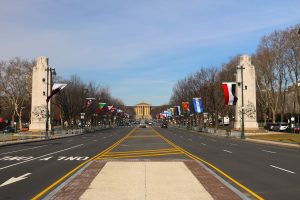
Clean Air Council, Feet First Philly, 5th Square, and the Bicycle Coalition unveiled a Recovery Streets platform to serve as a roadmap to safely transform street space in Philadelphia during and as we recover from COVID19.
This plan gives a menu of options for the types of solutions that the city should implement in the months ahead. While we applaud the City for its initial move to close MLK Drive to vehicle traffic, there has been little progress toward creating areas where people can safely be outside, or to address concerns regarding pedestrian safety along routes to essential businesses. These solutions will be increasingly more important as we start to recover from the COVID19 pandemic.
As businesses reopen, if these measures aren’t put into place Philadelphia will suffer worse congestion and gridlock than pre-COVID, and damages to air quality, road safety, and equity will be greater than before.
States are beginning to ease stay at home orders, and people are eager to be outside for necessity during the hot summer months, but they need to be able to do so safely. Unfortunately, pedestrian fatalities are nearly 88 percent higher in 2020 than this time last year. That is why now is the right time for Philadelphia to invest in its residents and implement measures that reduce crashes and keep pedestrians out of harm’s way.
Philadelphia’s COVID19 recovery is a chance for the City to be a leader in this space and move toward the Mayor’s Vision Zero Goals. Please take the time to read our Recovery Streets platform to learn how we believe the City of Philadelphia can be a leader in COVID19 recovery. Click here to read our full platform then sign our petition in support.
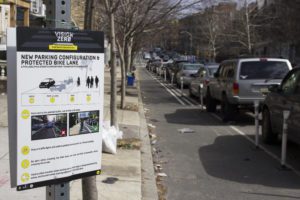
Clean Air Council joined the Bicycle Coalition and other Vision Zero Alliance advocates for a day of action on Tuesday, April 30th in Harrisburg. Advocates spoke to State Representatives and Senators about critical legislation needed to make streets safer for all road users.
If passed, this legislation would allow comprehensive integrated protected bike lane networks throughout Pennsylvania, create safe cycling and pedestrian spaces, and reduce dependence on automobiles. Protected bike lanes make bicycling safer, and are one of the best ways to protect pedestrians.
Pennsylvania State Senate Bill 565 (SB 565) and its companion House Bill 792 (HB 792) would allow pedestrian plazas and bike lanes on state roads to be separated and protected by parked cars. The bill was sponsored and introduced yesterday by 1st District State Senator Larry Farnese of Philadelphia.
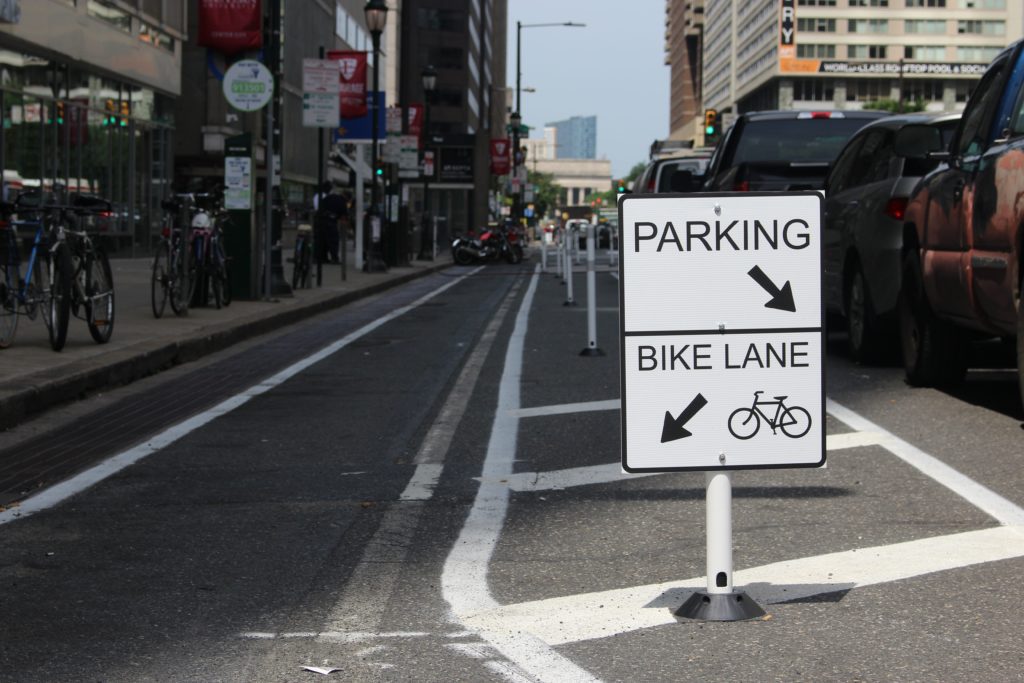
On state roads, pedestrians are 6.5 times more likely to die in crashes than non-pedestrians. While similar numbers of pedestrians involved crashes occur on local roads, 75% of pedestrian crashes that result in a fatal injury are on state roads. Protected bike lanes reduce traffic speeds by narrowing the road, calm intersections by reducing the turning radius, and create a shorter crossing distance for pedestrians.
House Bill 37, another important bill the Council advocates for, would ban hand-held cell phones while driving. The Fredricks family, whose daughter Emily was killed on her bicycle by a distracted driver while biking in the bike lane near 11th and Spruce Streets in Center City, spoke to legislators about their daughter and asked Senators and Representatives to pass legislation to prevent other families from experiencing similar tragedies. Distracted driving caused by cell phone use is a major cause of bicycling and pedestrian fatalities in Pennsylvania, and quadruples the risk of a crash. The Council asked legislators to join neighboring states New Jersey, Delaware, and Maryland in banning hand-held phones while driving.
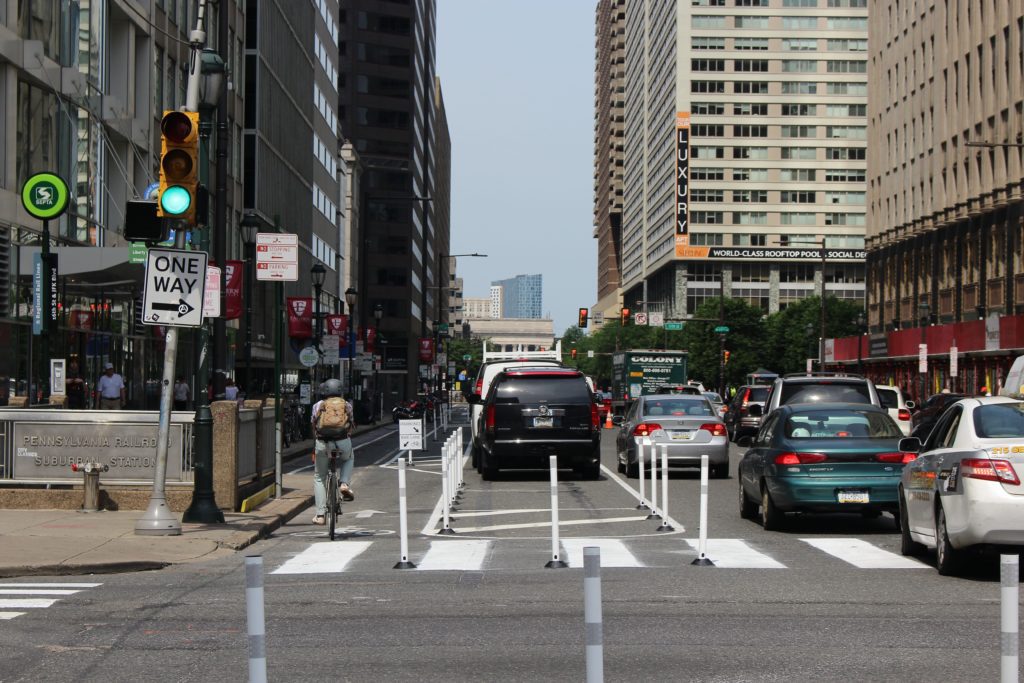
The Council also asked legislators to bring two bills to the floor that would have a major impact on road user safety. The first, a radar bill, (HB-1275) would allow municipal police to use radar technology. Pennsylvania is currently the only state in the country that does not allow municipal police from using radar to detect vehicle speeds. Speed is the largest predictor of how serious a crash can be. The difference of just 5 or 10 miles an hour can mean life or death.
Pennsylvania can more effectively slow drivers down by putting radar technology in hands of law enforcement across the Commonwealth. The second bill, yet to be introduced, would protect vulnerable road users including pedestrians, motorcyclists, horse and carriages, farm equipment, and others by requiring a minimum of four feet to pass. Many parts of the state do not have sidewalks, especially on the particularly dangerous state roads, and vulnerable road users must be afforded the protection of a minimum passing distance.
Creating safer roads for everyone is a common theme throughout all the bills presented to legislators on this day of action. Everyone has the right to travel safely, and a bipartisan focus on reducing traffic deaths, will create safer roadways for all users.
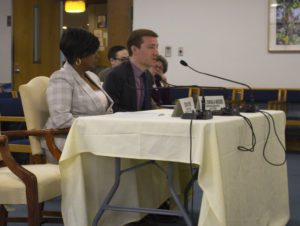
Clean Air Council Transportation Program Director Nick Zuwiala-Rogers spoke at a policy hearing held to address the rising numbers of vehicle related pedestrian deaths and injuries. Senator Sabatina’s district surrounds part of Roosevelt Boulevard which is regarded as one of the most dangerous roads in the country. Read our full testimony below.
(Philadelphia, PA–April 5, 2019)–Thank you for the opportunity to present testimony on behalf of Clean Air Council today. My name is Nick Zuwiala-Rogers and I am the Transportation Program Director at Clean Air Council. Clean Air Council sponsors Philadelphia’s pedestrian advocacy organization, Feet First Philly. The Council and Feet First Philly are members of the Vision Zero Alliance, a diverse coalition working to reduce traffic deaths to zero.
The Council is a member supported environmental advocacy organization whose mission is to protect everyone’s right to a healthy environment. Because transportation is the leading contributor of greenhouse gas emissions, the Council has a major focus on promoting sustainable forms of transportation, including walking. Feet First Philly works to promote walking as a form of transportation and recreation, protect the rights of pedestrians, and improve the pedestrian experience in Philadelphia.
News reports from earlier this year showed that pedestrian deaths in Pennsylvania were up 41% in the first half of 2018 over the same period in 2017, raising widespread concerns. While this trend is alarming, a lack of pedestrian safety is nothing new. Based on the last 5 years of publicly available crash data, pedestrians are 4-5 times as likely to be killed in a crash than non-pedestrians. On state roads, this increases to 6.5 times as likely for pedestrians to die in crashes. While state roads and local roads make up about the same number of crashes involving pedestrians, 75% of the ones that result in a fatal injury are on state roads. I say this to highlight the importance of the state taking a lead role in ensuring pedestrian safety. Local municipalities like Harrisburg, Bethlehem, and Philadelphia are engaging in Vision Zero policies, and the state should be a leader in these initiatives. This statistic also highlights that the most dangerous places to walk are the arterials that connect people to jobs, commercial corridors, healthcare, and public transit options. These state roads that are so critical to mobility are the same ones that are engineered with cars in mind first, and often provide no safe way for people to walk. This presents a clear and unfortunate equity issue where the lives of those who cannot afford a car matter less.
It is fitting we are holding this hearing in Northeast Philadelphia, not far from Roosevelt Boulevard, one of the deadliest roads in the country, which has been unfortunately referred to as “the Boulevard of death.” Roughly one person dies on this road every month, and about half of those people are pedestrians. On this road, last year, the state voted to allow an automated speed enforcement pilot in order to decrease the loss of life here. Expanded use of automated enforcement techniques, including for running red lights and speeding, are some of the tenants of Vision Zero that have worked well in other places. Vision Zero is the concept that fatalities as a result of traffic violence are avoidable, and none should be acceptable. The policy focuses on reducing traffic deaths to zero, with a focus on the most vulnerable road users – pedestrians.
Another tenant of Vision Zero is how we engineer our roads. Being a pedestrian can be a daunting experience, particularly on state roads where pedestrians are so much more likely to be killed. These roadways are clearly designed for cars not people, which is fundamentally wrong in my opinion, and I will guide you through the pedestrian experience walking in Pennsylvania. Being a pedestrian on a state road means you likely will not have a safe space to walk, like a sidewalk. Instead, you might be walking directly beside cars traveling at high rates of speed that will kill you in the event of human error. Even if you do have a sidewalk, you might have to walk up to a mile to the nearest safe crossing. When you get there, there may or may not be a crosswalk. If there is one, there is a good chance it is blocked by a parked car, or a car who did not stop behind the stop bar, as is the norm. When you get the opportunity to cross in that crosswalk, you will now be competing with turning cars who will race to get through the intersection before you have a chance to establish your right of way. As you cross a wide arterial road, you will quickly start to run out of time and could be stranded on the median as cars speed by you, if you are lucky enough to find refuge space in the center of the road.
This experience is the result of decades of prioritizing designing roads to maximize how many and how fast we can move cars, and ignoring the safety of actual people. As a legislative body, you should task our state’s DOT with prioritizing safety over throughput – lives saved over moving as many cars as quickly as possible. Sometimes that means we get places a little slower, but that sacrifice means we save lives.
The good news is there are a few bills that are either already introduced, proposed in previous sessions, or soon to be introduced this year that can help to improve pedestrian safety. I will outline four of them here, and the ways they would protect pedestrians. Two of these bills will specifically target two of the most dangerous behaviors identified by PennDOT’s crash data – speed and distracted driving.
RADAR for Local Law Enforcement (previously SB 251) – Simply put, speed kills. A pedestrian hit at 40 mph has a 10% chance to survive. That number increases to 50% at 30 mph, and a pedestrian hit at 20 mph has a 90% chance to live. In the absence of other automated enforcement techniques, radar should be implemented as a minimum way for officers to objectively track speed. Pennsylvania is the only state in the country not to use this basic technology.
Hand Held Ban (HB 37) – Distracted driving is a major cause of pedestrian fatalities in the state, and is one of the most dangerous behaviors according to crash data. Preventing distracted driving from cell phone use is common sense. According to AAA, 85% of people think cell phone use is a threat to safety, and all of our northeast neighbor states have cell phone restrictions. The gravity of the danger cell phone use generates cannot but overstated, we cannot allow drivers to be distracted by these devices while operating on our public roadways any longer.
Vulnerable Highway User Protections (previously HB 1646) – PA has a minimum 4 foot law for passing cyclists, and this bill would put the same protections on pedestrians and other vulnerable road users, and raise the fines where careless driving results in the death of a vulnerable user. Vulnerable road users do not have the same protections as those in a vehicle, including air bags and other safety features. Many parts of the state do not have sidewalks, especially on the particularly dangerous state roads. When pedestrians are not afforded a safe distance when cars pass them, it creates a lack of human dignity and speaks to equity concerns of whose lives matter. An important piece of this legislation is that it considers the principle of Vision Zero that human error is inevitable, and we should control for it.
Protected Pedestrian Plazas and Pedalcycle Lanes (previously HB 1657) – Legislation is needed to allow cities like Philadelphia who are interested in implementing Vision Zero strategies to do so. One of the best ways to protect pedestrians is by installing protected bike lanes, which is often done by using parking as the protection area. This actually has a greater impact on pedestrian safety than bicyclists because it shortens the crossing distance of the road, allow pedestrians a “head start” to establish themselves in the crosswalk before turning cars, and overall calms speeds by narrowing the cartway.
In closing, I want to bring this back to the foundation of the issue, and that is people and their dignity. Everyone at some point is a pedestrian. People – whether, drivers, transit users, pedestrians, children, seniors, people with a disability – however they use the road, should have the dignity to know they can make it to work, or to a family member’s house, or to the store, and back home again without dying, no matter how they are getting to those places. Currently, that is not true for Pennsylvanians who walk in our public spaces. Pedestrian safety cannot wait any longer and requires this legislative body to take action.
Thank you for your time today, and I look forward to working with all of you to move these policies forward.
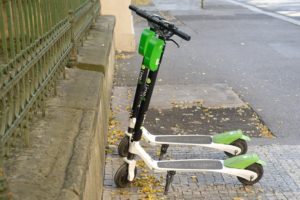
Two major steps toward bringing dockless electric scooters to Pennsylvania and Philadelphia happened this week. Rep. Greg Rothman, R-87th, of Cumberland County and Rep. Stephen Kinsey, D-201st, of Philadelphia introduced HB 631 on Tuesday, that would add electric scooters to the “Special Vehicles and Pedestrians” section of Pennsylvania’s vehicle laws.
Today, Philadelphia City Council held a public hearing on dockless e-scooters and Clean Air Council delivered comments in support of this alternative mode of transportation, along with some of our concerns for how they would be implemented.
Electric scooters have the potential for great environmental benefits, and the Council is excited to see them possibly coming to Philadelphia in the future. The transportation sector in the United States makes up roughly 30% of greenhouse gas pollution, and a large portion of that comes from personal vehicles.
Public transportation, bikes, and walking are well known long-term alternatives to replace car trips, and the Council believes e-scooters are a new low emissions mode and an alternative that may take more cars off the road.
Studies in Cincinnati and Portland show that roughly 1/3 of scooter trips replaced either a personal car or an Uber/Lyft. Motor vehicle congestion is a major contributor to poor air quality in Philadelphia so alternatives to single occupancy vehicle trips must be considered. The Council supports these innovative companies working with the Office of Transportation, Infrastructure, and Sustainability to come up with transportation solutions that will reduce air pollution and the effects of climate change.
The Council believes it is not enough for the e-scooter trips to be low-emission, and believes part of the permit process should be that companies employ sustainable business practices when operating here. Two points are critical. First, the energy sourced for the trips should be renewable either through credits, or through the grid itself. Second, and most importantly, the companies operating in Philadelphia should commit to disposing of their waste sustainably, and recycling all of it.
Sustainable disposal of scooters that are no longer useable is important to the Council since companies turnover their fleet at least annually. No scooters used in Philadelphia should end up in a landfill. The batteries and other electronic components should be dealt with through sustainable e-waste practices, and the other parts of the scooters should be recycled or reused. How these companies deal with this waste is critically important from an environmental perspective.
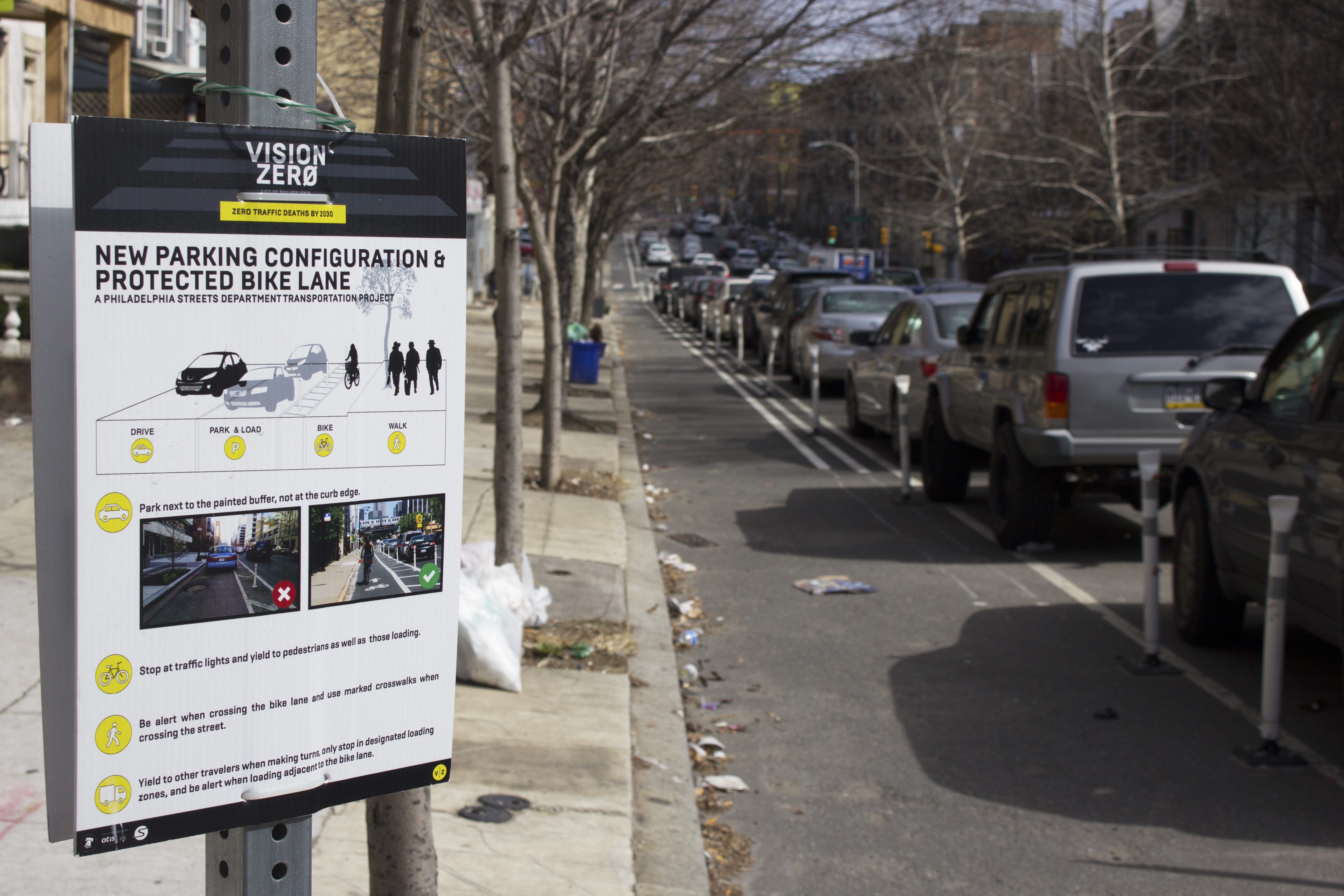
The Council believes e-scooter companies should commit to being part of the city’s Vision Zero goals. Users who feel safe on our streets are central to their business model. This means investing in all of Philadelphia’s alternative transportation modes and contributing to a fund that takes a portion from each ride and puts it toward safe infrastructure.
These funds should be diverted from the General Fund and go to meet the city’s Vision Zero goals either through projects like restriping our roads, installing pedestrian bump-outs, education campaigns, or other engineering projects.
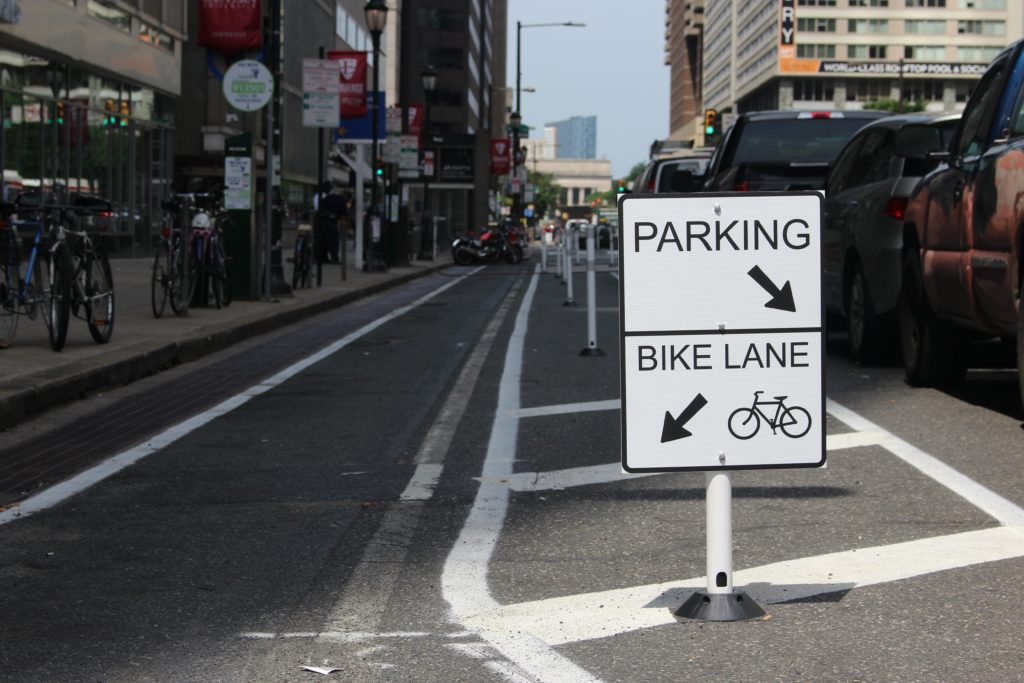
The Council also supports the rights of pedestrians to travel uninhibited on public sidewalks, walkways, and crosswalks and wants to ensure that people follow the law by not riding e-scooters on sidewalks. The best way to protect pedestrians from scooters riding on sidewalks is to create streets that are safe for all users. Safety includes having good policies in place to prevent scooters from inhibiting pedestrians. Enforcement should occur through the e-scooter apps and ensure that rides cannot end until the scooter is parked in an appropriate location that does not inhibit pedestrians.
Equally important to safety and sustainability is equity. These scooters will use public resources to operate, so they should serve all Philadelphians. Other cities require a certain percentage of scooters be placed in low-income and predominantly minority neighborhoods, and Philadelphia should not only do this, but lead the way with the most progressive regulations for equitable re-balancing. This would be in accordance with the demographics of our city. Companies should also be required to accept cash payment and be available to riders who don’t have a smartphone.
While the Council has several concerns about implementing scooters in a way that prioritizes sustainability, safety, equity, and transparency, we believe the city and the companies that want to operate here can address all of these concerns. The Council is excited about any new mode that curbs greenhouse gas emissions – we have a little more than a decade left to make major reductions to avoid the worst effects of climate change, and we cannot afford to miss out on opportunities to electrify a large portion of our transportation fleet.
Click here to read a full transcript of our e scooter testimony
PHILADELPHIA, PA (June 4, 2018)- Clean Air Council joined other advocates testifying at City Council in support of the proposed changes to Spruce and Pine Streets in Center City. The project would include protecting intersections and moving the bike lane to the left side of the road where there is a smaller blind spot for drivers. These changes would increase safety and make non-motorized travel along these streets more comfortable and enjoyable. Read the Council’s testimony below to understand why it supports the proposal now, and what it would like to see in the future.
Thank you for the opportunity to present testimony on behalf of Clean Air Council today. My name is Nick Zuwiala-Rogers and I am the Transportation Program Director at Clean Air Council. My work includes promoting sustainable modes of transportation like public transit, walking, and cycling.
Clean Air Council is one of the Philadelphia region’s oldest environmental organizations, serves thousands of members in the city, and has a mission to protect everyone’s right to breathe clean air. The Council supports the proposed project on Spruce and Pine and the associated bills to change parking along these roads, and believes it will help improve air quality in Philadelphia.
According to the U.S. Energy and Information Administration (EIA), the transportation sector has produced more carbon pollution than any other sector since 1979. The EIA has cited the country’s over reliance on single-occupancy vehicle travel and a failure to prioritize non-driving modes of transportation as having a profound impact on this result. Philadelphia needs to do better at prioritizing other modes of transportation like walking, public transportation, and bicycling, and this project offers an opportunity to do that.
Due to the congestion that this City Council has noted recently, center city has some of the worst localized air quality in the city. Therefore, increasing the number of people getting around without using a car should be a priority for this Council. Increasing the safety and comfort of cyclists and pedestrians is the only way to make that happen.
Protected bike lanes are a proven solution for making all road users safer, and getting more people comfortable biking, thereby increasing mode share away from congestion-creating automobiles downtown. A Federal Highway Administration study found 96% of cyclists feel safer riding in a protected bike lane, and safety for cyclists and vehicles improved in nearly every aspect where flex posts or parking protected bike lanes were installed. A physical separation reduces traffic speeds, calms intersections by reducing the turning radius and forcing slower speeds, and creates a shorter crossing distance for pedestrians. I understand that is not what is proposed today, but I should be clear that physical protected bike lanes are ultimately what the Clean Air Council supports.
While this project does not go as far as creating the protected bike lanes that should eventually be installed on these roads, the protections at intersections and the move from right to left side of the street offer key incremental changes that will make road users safer on Pine and Spruce Streets. Importantly, the protected intersections that are a part of this project would help to prevent crashes like the two last year that ended fatally for one person, and with nearly the same result for another. The move to the left side of the road will decrease the space that a cyclist is in a vehicle’s blind spot, especially trucks which are so deadly.
These two roads are the main arterials across center city for cyclists, and are two of the most used bike lanes in the city. The current design is frankly way behind the times and way behind where a city like Philadelphia needs to be with its infrastructure. These safety improvements are not just needed, they are long overdue, and Clean Air Council strongly urges you to support the proposed bills in front of you today.
Thank you for the opportunity to speak with you this afternoon, I’d be happy to take any questions now or discuss any of these matters more with you outside of this meeting.
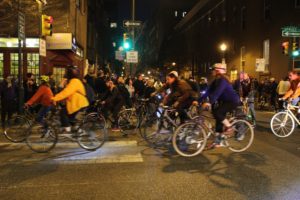
City Council unanimously passed two ordinances today allowing the Department of Streets to designate two bike lanes and an ordinance removing parking along the 8200 block of Torresdale Avenue in Northeast Philadelphia where the Pennypack Trail crosses.
This is a small step toward achieving the Mayor’s campaign promise and Vision Zero plan for 30 miles of bike lanes. So far there are two miles. The bike lane along Race Street will be protected between 8th and 6th Street, and continue as an unprotected lane between 6th and 5th.
The second bike lanes will be installed along Island and Enterprise Avenues in Southwest Philadelphia. Councilman Johnson issued this statement to Clean Air Council on the importance of this bike lane and his thoughts on future trail connections in his district:
“This bill is part of the ongoing collaboration between my office and OTIS to advance Vision Zero goals. My priority is making city streets safe and inclusive. This particular proposed ordinance is the result of collaboration between my office, the Philadelphia International Airport, and community and advocacy groups to improve street safety in Southwest Philadelphia.
I believe bike lanes are beneficial to the city as a whole and this will help cyclists commuting in Southwest. We have received support for the bill from the Bicycle Coalition of Greater Philadelphia and community groups, who were consulted during the bill’s drafting. In cases like this one, where there are not the same space constraints and traffic or construction levels you have in Center City, there’s more opportunity for solutions that work for everyone.
In terms of the East Coast Greenway, my mind goes immediately to the Schuylkill River Trail and our work to connect South Philadelphia and Southwest Philadelphia portions of the trail between Grays Ferry and Bartram’s Garden, as well as fill in the missing links of South Philadelphia to expand access to the trail. I occasionally bike the Trail myself and I understand firsthand the importance of safety while cycling in the streets as well as expanding our greenways.”
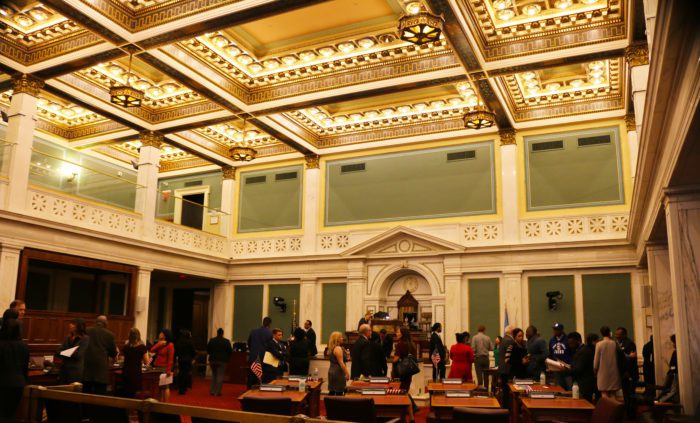
On Thursday, Councilman Mark Squilla, Chair of the Streets and Services Committee, introduced three bills on the Council floor proposing two new bike lanes, and eliminating parking along Torresdale Avenue where the Pennypack Trail crosses in Holmesburg.
This came a day after the Streets and Services Committee moved forward on the bills. According to Plan Philly, City Spokesman Mike Dunn told them in an email that he hopes the lanes will be open by the end of the year.
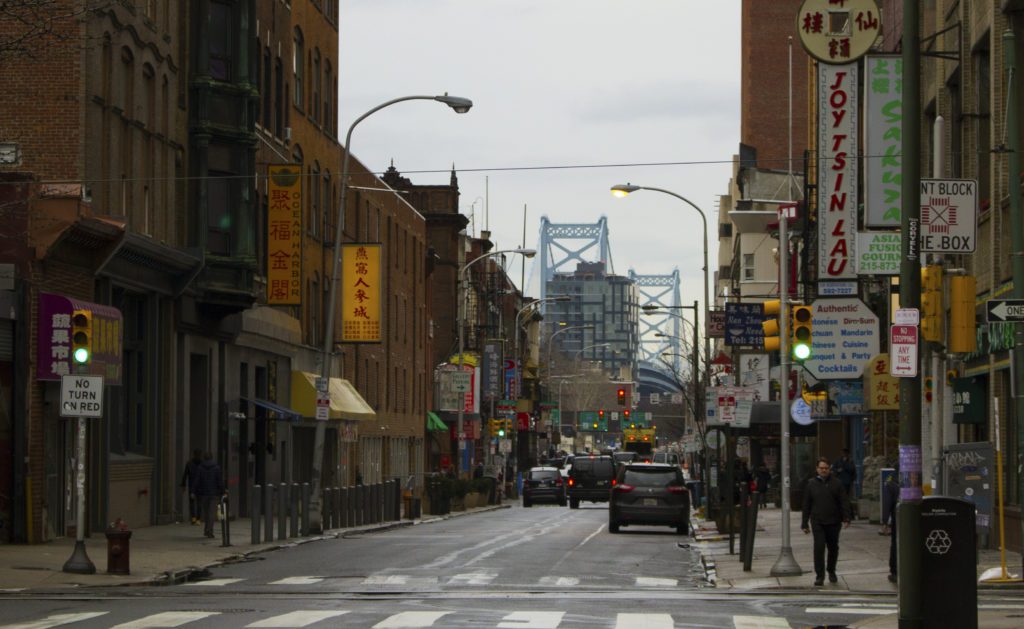
Race Street in Chinatown
One of the proposed bike lanes would be installed along Race Street between 8th and 5th streets in Chinatown. This particular corridor is heavily trafficked, especially during rush hour, with vehicles headed toward the Ben Franklin Bridge. Race Street turns from three to four lanes that are not clearly marked, adding to potential driver confusion.
The new lane would be parking protected from 8th to 6th, and would also create a much safer connection between Chinatown and Franklin Square, which is one of the only green spaces in the neighborhood.
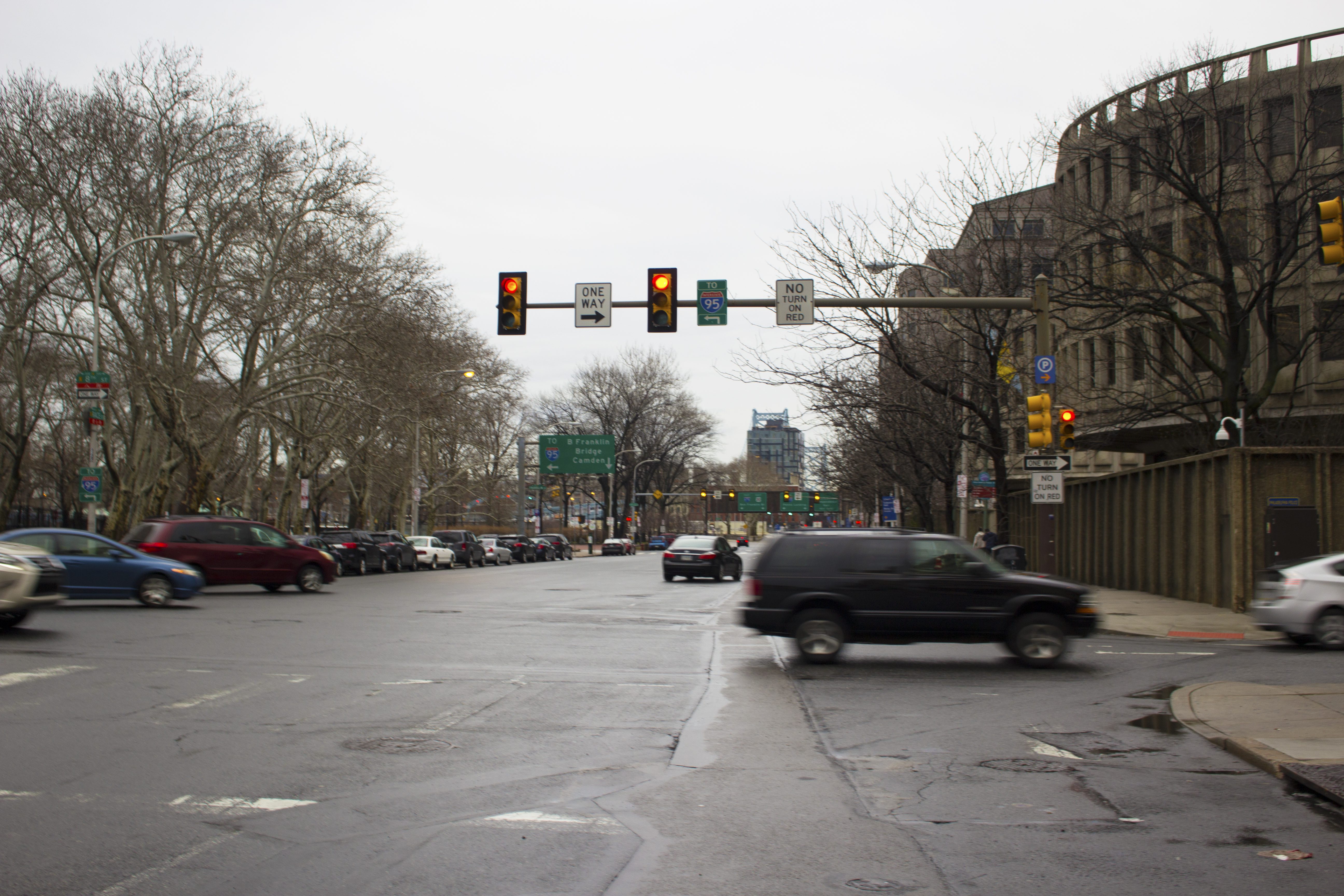
Race Street at 8th Street looking East
The second bill is to install non-protected bike lanes in both directions along Island Avenue and Enterprise Ave in Southwest Philadelphia near the airport. These lanes will allow cyclists who work in this business and industrial area a safe path from nearby transit stops like the Eastwick Regional Rail Station.
The third bill, proposed in committee by Councilman Henon, removes parking along the 8100 block of Torresdale Avenue in order to allow Pennypack Trail users a clear place to cross the road. This is a wooded stretch of Torresdale Avenue is a key crossing point of the 14.4 mile trail that runs from Huntingdon Valley in Montgomery County all the way to Holmesburg in Northeast Philadelphia.
We spoke with Councilman Squilla briefly outside City Council chambers. “Councilman Henon introduced a bill, and we’re strongly in favor of the bill to allow the trail to continue,” Councilman Squilla said.” “I think it’s a great way to have more open space.”
All three of these are key to the success of Philadelphia’s Vision Zero plan. Safe connections like the Pennypack Trail at Torresdale Avenue will allow people to pursue alternative modes of transportation, and ease the pollution and congestion cars produce every day.
“This just lends the City’s upward motion to keep people who have different modes of transportation and ways of getting to different locations through this trail connector which is a great thing for not only the City but hopefully throughout the Commonwealth,” Councilman Squilla said. “Any time you can have dedicated trails, and people where they are put in a place where it’s safer to transverse, it definitely will help with our plan for Vision Zero.”
